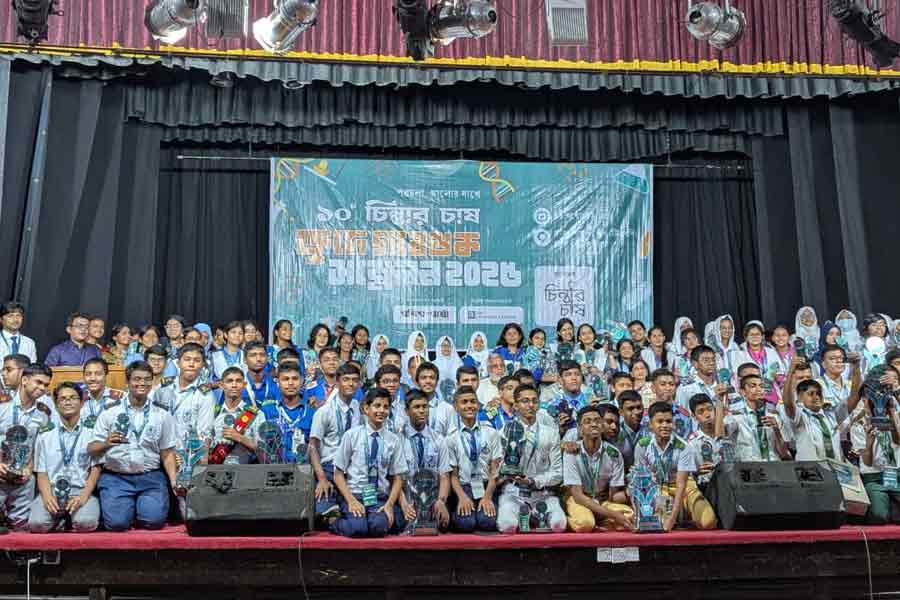Young researchers gather at DU for 10th ‘Chintar Chash’ Conference

Published :
Updated :

With the theme Journey with Light, the 10th Chintar Chash Young Researchers’ Conference 2025 was held on Saturday (October 11) at the auditorium of Dhaka University’s Teacher-Student Centre (TSC). The event was organised by the voluntary research organisation "Chintar Chash", as part of its annual initiative to promote a culture of inquiry and innovation among young minds.
A total of 339 students from classes 7 to 10, selected through preliminary screening from different regions of the country, presented their research papers and concept notes at the conference. Nearly 100 research papers, seven concept presentations, and 12 research posters were showcased at the event. Around 50 university teachers and researchers served as judges, evaluating the presentations under nine categories across multiple groups.
The inaugural session was attended by Dr. Mobarak Ahmed Khan, former member of the Bangladesh Atomic Energy Commission; Professor Dr. Upama Kabir, Dean of the Faculty of Engineering and Technology, University of Dhaka; and Asjadul Kibria, Planning Editor of The Financial Express.
In his remarks, Dr. Mobarak Ahmed Khan emphasised the importance of developing research solutions based on local resources. “Our innovations must emerge from our own context. If we nurture these young students presenting their research today, they can become the true scientists and researchers of tomorrow. We must believe in the slogan "Bangladesh is a land of science, Bangladesh is a land of scientists."
Asjadul Kibria said, “Chintar Chash is nurturing the future generation of talented individuals. This gives us hope that there is no uncertainty about Bangladesh’s future.”
Professor Dr. Upama Kabir highlighted three essential principles of research: “First, learn to ask questions. Second, identify whether it’s truly a problem. Third, conduct research to solve," she added, "Research should not remain limited to paper; it must have practical application.”
The closing and award ceremony featured Muhammad Fawzul Kabir, Adviser to the Ministries of Power, Energy and Mineral Resources; Road Transport and Bridges; and Railways, as the chief guest. Mohammad Wahid Hossain, Chairman of the National Defence College (NDC), attended as a special guest.
Fawzul Kabir said, “In our time, education was about earning a diploma. Today, degrees alone hold little value; skills matter more. Big companies now look for competence, not certificates. Students must think about how their education can be useful in real life".
He encouraged young learners to aim high, “Our nation’s achievements are still limited; we have only one Nobel laureate. Even a small country like Israel has many. I hope one day Bangladeshi students will win Nobel Prizes in physics, chemistry, and medicine.”
S. M. Mesbah Rahman, Executive Director of Chintar Chash, noted that Chintar Chash provides year-round research training to students across the country, helping them learn topic selection, research methods, and practical application.
Professor Dr. Zeba I. Seraj of the University Grants Commission urged the young researchers to stay alert on social media, “Be cautious, Western media often tries to brainwash us. The reality of Palestine opened my eyes. Their media spreads misinformation, and we must remain aware.”
NDC Chairman Mohammad Wahid Hossain stressed the importance of critical thinking and warned about technology’s impact on focus, “No nation has progressed without research. What separates humans is the power to think. But tools like mobile phones are weakening our concentration,” he said. “Some countries have even banned phone use before a certain age. Now AI poses a bigger challenge, its own creators predict a 15–20% chance it could destroy civilisation. To survive, we must think better and deeper than AI.”
In his closing remarks, Advocate Muhammad Shafiqul Rahman, Chairman of Chintar Chash, said, “Our research must serve the people, the workers, farmers, and the marginalised. "Chintar Chash" does not aim for immediate results; it strives for progress that benefits generations to come.”
armanhossen7971@gmail.com


 For all latest news, follow The Financial Express Google News channel.
For all latest news, follow The Financial Express Google News channel.